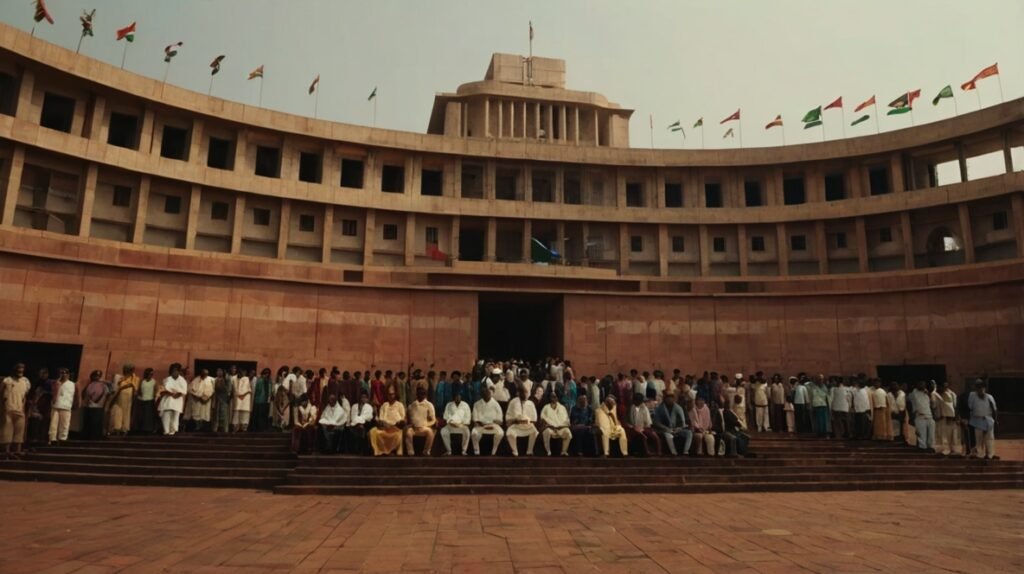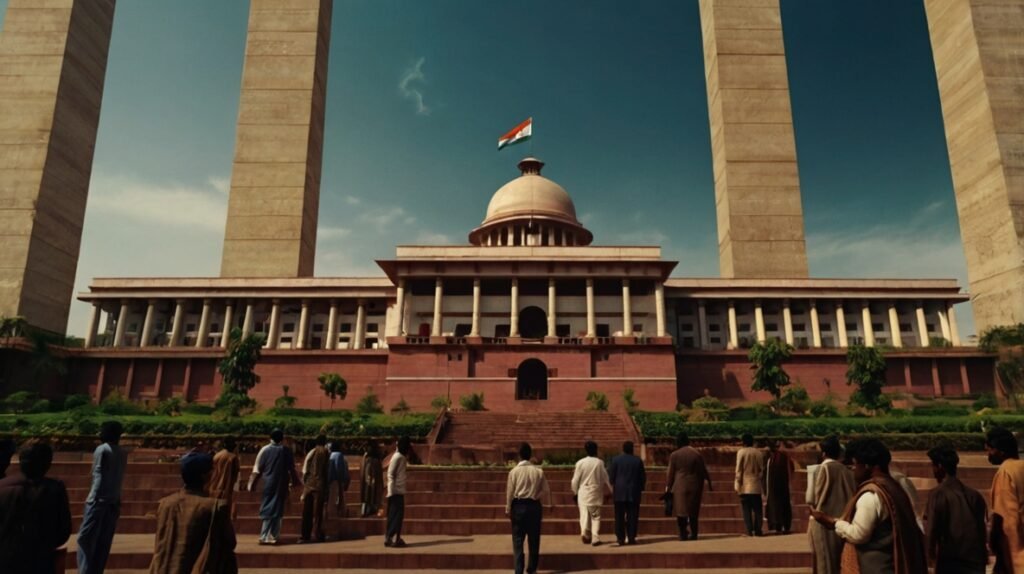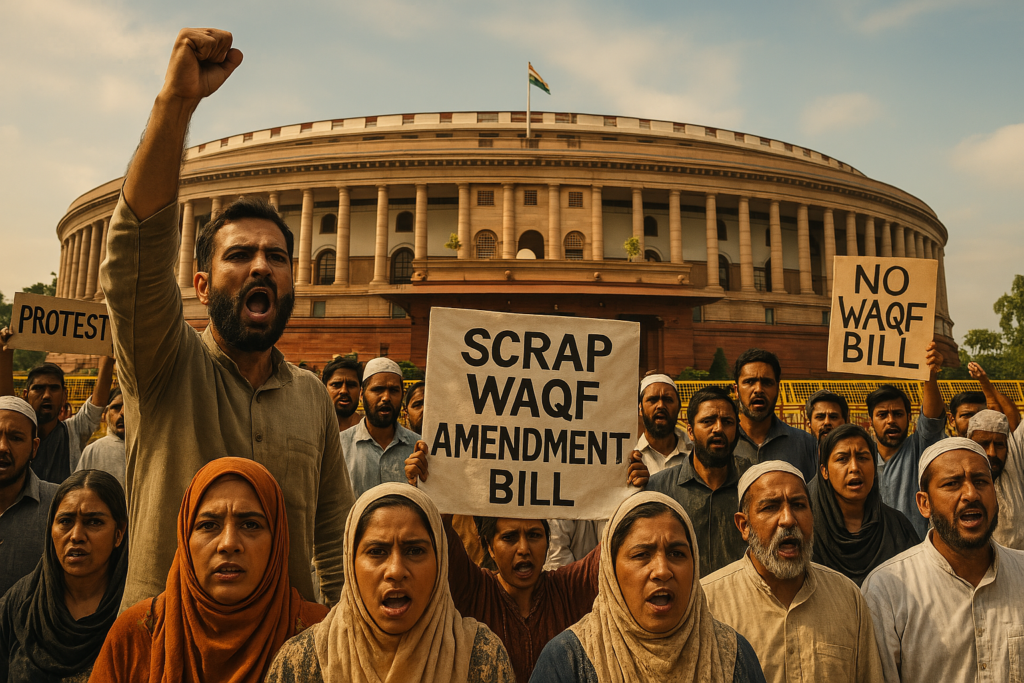The Waqf Amendment Bill 2025 has ignited a political firestorm across India, with massive protests erupting from the streets to the Supreme Court. The controversial legislation, which seeks to amend the governance of Waqf properties, has faced severe backlash from opposition parties, civil society groups, and religious organizations. Critics argue that the bill grants excessive powers to Waqf boards, leading to fears of land encroachment and misuse of authority.
As tensions escalate, opposition leaders have filed multiple pleas in the Supreme Court, challenging the constitutional validity of the bill. Meanwhile, the ruling party defends the legislation, claiming it will streamline Waqf administration and curb corruption. With the Waqf Bill in Rajya Sabha pending approval, the nation watches closely as political debates intensify.
In such politically charged times, it becomes essential to maintain emotional and mental balance. Exploring simple daily habits that enhance mental health and happiness can help individuals stay grounded while navigating the noise of national controversies.
This article delves into the key aspects of the Waqf Amendment Bill criticism, its implications, and whether the Waqf Bill passed or not in Parliament.

1. Waqf Amendment Bill 2025: What Does It Propose?
The Waqf Amendment Bill 2025 aims to overhaul the management of Waqf properties in India. Waqf refers to Islamic endowments, including land and assets donated for religious or charitable purposes. The bill proposes granting Waqf boards greater autonomy in leasing, selling, or developing Waqf-owned properties.
Supporters argue that the amendments will prevent illegal encroachments and ensure better utilization of Waqf assets. However, critics fear that the bill could lead to arbitrary land acquisitions, disproportionately affecting non-Muslim communities. The legislation has also raised concerns about transparency, with opposition leaders demanding stricter oversight mechanisms.
2. Waqf Amendment Bill Criticism: Why Are People Protesting?
The Waqf Amendment Bill criticism stems from allegations of favoritism and lack of accountability. Civil rights activists claim that the bill empowers Waqf boards to reclaim properties without sufficient legal scrutiny. Several states have witnessed violent protests, with demonstrators accusing the government of undermining secular principles.
Legal experts highlight potential conflicts with existing land laws, arguing that the bill could create jurisdictional disputes. Opposition parties have labeled it as “unconstitutional,” citing violations of property rights. The Supreme Court’s intervention is now sought to examine whether the bill infringes upon fundamental rights.
3. Waqf Bill in Rajya Sabha News: Political Showdown Ahead
The Waqf Bill in Rajya Sabha news has dominated headlines as political parties gear up for a heated debate. The ruling BJP, with its majority in the Lok Sabha, faces resistance in the Rajya Sabha, where opposition parties hold significant influence. Key allies have also expressed reservations, complicating the bill’s passage.
If the Waqf Bill passed or not remains uncertain, given the Rajya Sabha’s unpredictable voting patterns. Political analysts suggest that backdoor negotiations are underway to secure additional support. Meanwhile, public demonstrations continue, adding pressure on lawmakers to reconsider the bill’s provisions.
4. Waqf Amendment Bill Opinion: Divided Reactions
Public Waqf Amendment Bill opinion is sharply polarized. Religious leaders from the Muslim community largely support the bill, viewing it as a step toward better management of Waqf assets. However, Hindu and Christian groups have raised objections, fearing discriminatory implementation.
Legal scholars remain divided—some argue that the bill modernizes outdated Waqf laws, while others warn of potential misuse. The Supreme Court’s upcoming hearing will play a crucial role in shaping the final outcome.
5. Waqf Bill Passed or Not: Current Status & Future Implications
As of now, the Waqf Bill passed or not is still undecided. The Rajya Sabha’s vote will determine its fate. If approved, the bill could reshape property disputes across India. If rejected, the government may reintroduce it with modifications.
The controversy highlights deeper tensions over religious and land rights in India. The Supreme Court’s verdict will set a precedent for future legislation on religious endowments.

FAQs on the Waqf Amendment Bill 2025
1. What is the Waqf Amendment Bill 2025?
The Waqf Amendment Bill 2025 seeks to amend laws governing Waqf properties in India. It proposes greater autonomy for Waqf boards in managing assets, including leasing and selling land. Supporters claim it will prevent misuse, while critics argue it could lead to arbitrary land acquisitions.
2. Why is there criticism against the Waqf Amendment Bill?
The Waqf Amendment Bill criticism revolves around fears of unchecked powers for Waqf boards, potential land disputes, and lack of transparency. Opposition parties and civil groups allege it undermines secular principles and property rights.
3. What is the latest Waqf Bill in Rajya Sabha news?
The Waqf Bill in Rajya Sabha news indicates a political deadlock, with opposition parties resisting its passage. The BJP is negotiating with allies to secure votes, but protests and legal challenges continue.
4. What are the different opinions on the Waqf Amendment Bill?
Waqf Amendment Bill opinion is split—Muslim leaders support it for better asset management, while other religious groups oppose it, fearing bias. Legal experts debate its constitutionality, awaiting the Supreme Court’s decision.
5. Has the Waqf Bill passed or not?
As of now, the Waqf Bill passed or not remains uncertain. The Rajya Sabha’s vote is pending, and the Supreme Court’s intervention could further delay or alter its implementation.
Conclusion
The Waqf Amendment Bill has become a flashpoint in India’s political and legal landscape. With nationwide protests, Supreme Court pleas, and intense parliamentary debates, the bill’s fate hangs in the balance. Whether it will streamline Waqf management or trigger deeper communal tensions remains to be seen.
As citizens and lawmakers await the final decision, the controversy underscores the delicate balance between religious rights and secular governance. Stay informed—follow the latest Waqf Bill in Rajya Sabha news for real-time updates.

- Here are three credible sources that support the information in the article, along with brief explanations of their relevancy:
Relevancy:
This article offers a comprehensive overview of the nationwide protests & Waqf Amendment Bill opinion , legal challenges, and political reactions surrounding the Waqf Amendment Bill 2025. It highlights how the issue has escalated to the Supreme Court and provides real-time developments, making it a highly authoritative source for current events and reactions.
2. BBC News
Relevancy:
The BBC article adds international credibility and neutral journalistic insight into the controversy. It explains the public and political backlash from a global perspective and helps contextualize the issue beyond India, showing its potential implications on minority rights and religious trust management, along with Waqf Amendment Bill opinion.
3. Bar & Bench
Relevancy:
Bar & Bench is a legal journalism platform, and this article directly reports on Asaduddin Owaisi’s legal petition against the bill in the Supreme Court. It provides key legal arguments, case references, and updates from court proceedings—crucial for understanding the legal and constitutional dimensions of the bill.
Call to Action
What’s your take on the Waqf Amendment Bill?
Share your thoughts in the comments below and join the conversation! Don’t forget to follow us for breaking news on this developing story.
📢📢Unlock Your Online Potential with Hostinger!
Struggling with Social Media addiction? To know about The Dark Side of Social Media Click Here
Turn your screen time into income by creating a money-making website! With Hostinger’s affordable hosting, you can:
✅ Build a blog, e-commerce store, or portfolio in minutes
✅ Monetize through ads, affiliate marketing, or digital products
✅ Enjoy lightning-fast speed & 99.9% uptime
Exclusive 20% OFF for our readers:
👉 Hostinger Affiliate Link
Why Hostinger ?
✔ 1-click WordPress install (perfect for beginners!)
✔ 24/7 live chat support
✔ Free SSL certificate (secure your site)
Example Success:
Riya, a former Social Media addict, now earns ₹50,000/month from her self-care blog—built on Hostinger in just 2 days!
Your Turn:
1️⃣ Sign up with our link
2️⃣ Launch your site (use detox tips as content!)
3️⃣ Start earning while helping others break free!
💡 “Your phone is a goldmine—stop scrolling, start selling!”
**Affiliate Disclosure – “This page contains affiliate links. We may earn a commission at no extra cost to you.

